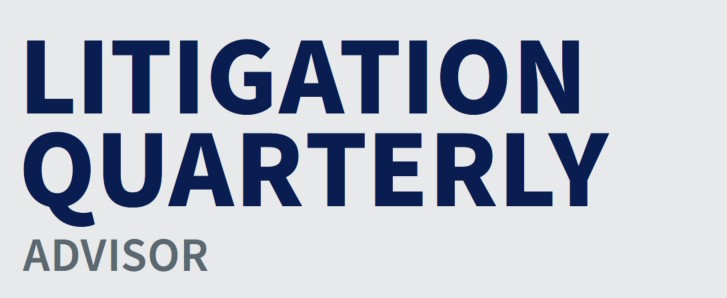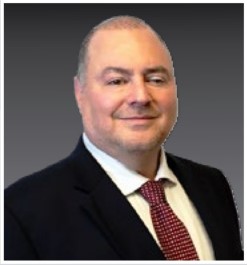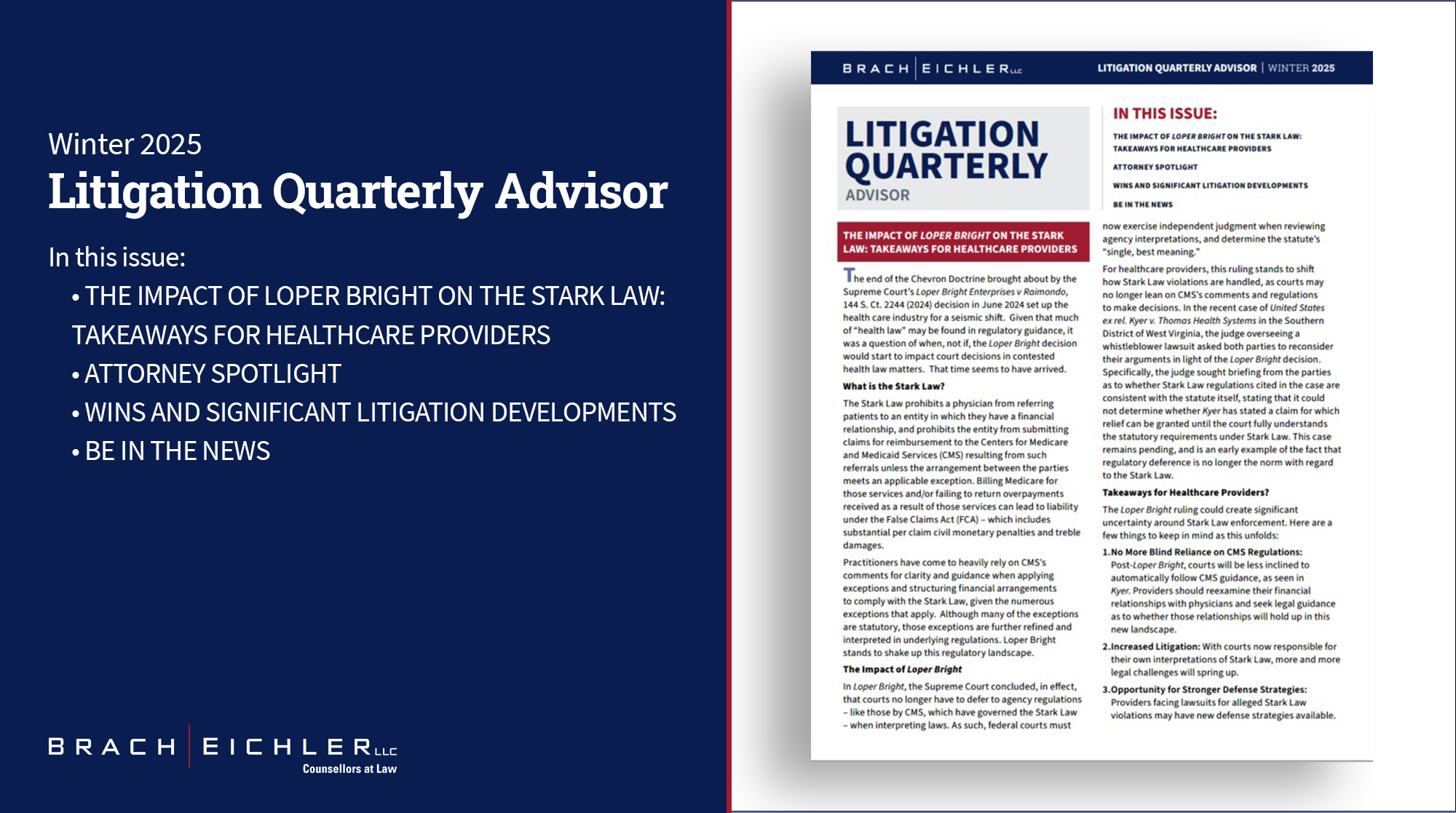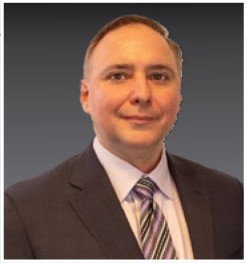

The end of the Chevron Doctrine brought about by the Supreme Court’s Loper Bright Enterprises v Raimondo, 144 S. Ct. 2244 (2024) decision in June 2024 set up the health care industry for a seismic shift. Given that much of “health law” may be found in regulatory guidance, it was a question of when, not if, the Loper Bright decision would start to impact court decisions in contested health law matters. That time seems to have arrived.
What is the Stark Law?
The Stark Law prohibits a physician from referring patients to an entity in which they have a financial relationship, and prohibits the entity from submitting claims for reimbursement to the Centers for Medicare and Medicaid Services (CMS) resulting from such referrals unless the arrangement between the parties meets an applicable exception. Billing Medicare for those services and/or failing to return overpayments received as a result of those services can lead to liability under the False Claims Act (FCA) – which includes substantial per claim civil monetary penalties and treble damages.
Practitioners have come to heavily rely on CMS’s comments for clarity and guidance when applying exceptions and structuring financial arrangements to comply with the Stark Law, given the numerous exceptions that apply. Although many of the exceptions are statutory, those exceptions are further refined and interpreted in underlying regulations. Loper Bright stands to shake up this regulatory landscape.
The Impact of Loper Bright
In Loper Bright, the Supreme Court concluded, in effect, that courts no longer have to defer to agency regulations
– like those by CMS, which have governed the Stark Law
– when interpreting laws. As such, federal courts must
agency interpretations, and determine the statute’s “single, best meaning.”
For healthcare providers, this ruling stands to shift how Stark Law violations are handled, as courts may no longer lean on CMS’s comments and regulations to make decisions. In the recent case of United States ex rel. Kyer v. Thomas Health Systems in the Southern District of West Virginia, the judge overseeing a whistleblower lawsuit asked both parties to reconsider their arguments in light of the Loper Bright decision. Specifically, the judge sought briefing from the parties as to whether Stark Law regulations cited in the case are consistent with the statute itself, stating that it could not determine whether Kyer has stated a claim for which relief can be granted until the court fully understands the statutory requirements under Stark Law. This case remains pending, and is an early example of the fact that regulatory deference is no longer the norm with regard to the Stark Law.
Takeaways for Healthcare Providers?
The Loper Bright ruling could create significant uncertainty around Stark Law enforcement. Here are a few things to keep in mind as this unfolds:
1. No More Blind Reliance on CMS Regulations: Post-Loper Bright, courts will be less inclined to automatically follow CMS guidance, as seen in Kyer. Providers should reexamine their financial relationships with physicians and seek legal guidance as to whether those relationships will hold up in this new landscape.
2. Increased Litigation: With courts now responsible for their own interpretations of Stark Law, more and more legal challenges will spring up.
3. Opportunity for Stronger Defense Strategies: Providers facing lawsuits for alleged Stark Law violations may have new defense strategies available. As in Kyer, there could be opportunities to challenge the interpretations that led to the enforcement action in the first place.
For healthcare providers, the Loper Bright decision has introduced unpredictability into compensation arrangements, referrals, and joint ventures that were once considered compliant under CMS regulations. But it’s not all bad news – this shift also presents an opportunity for providers to potentially challenge long-standing regulatory interpretations in enforcement actions. Providers should stay informed and proactive as this new era of Stark Law enforcement develops.
For more information, contact:
Keith J. Roberts | 973.364.5201 | kroberts@bracheichler.com
Neha Rao | 973.447.9668 | nrao@bracheichler.com
In a unanimous decision, the New Jersey Supreme Court vacated a $24.3 million award to a group of neurosurgeons over their claim that Valley Hospital was acting in bad faith when it signed an exclusive agreement with a competing surgical group. While the Supreme Court reversed the prior award for several reasons this article focuses on the interplay of whether hospital bylaws constitute a contract.
The plaintiffs, 11 neurosurgeons with New Jersey Brain and Spine Center, provided on-call coverage in Valley Hospital’s emergency department. They filed a suit challenging Valley’s decision to enter into an exclusive agreement with a competing neurosurgical practice for unassigned emergency patients and access to specialized neurosurgery equipment. Plaintiffs argued that Valley’s decision to grant the exclusive agreement to the other group was based on improper reasons which they claimed was a revocation of their hospital privileges.
Ultimately the Supreme Court established that a hospital’s medical staff bylaws do not constitute a traditional contract that support a claim for the breach of the implied covenant of good faith and fair dealing. The Court explained that with hospital bylaws unlike traditional contracts there is no mutual assent, no offer and no acceptance. Further, Valley’s bylaws existed prior to the plaintiff neurosurgeons obtaining privileges at the hospital.
Finally, the Supreme Court pointed out that hospitals maintain broad discretionary power in making administrative decisions related to healthcare because
courts are not positioned to weigh the complexities and intricacies that hospitals confront in advancing patient care. In sum, hospital administrative decisions will be upheld if: (i) the decision serves a public healthcare objective; (ii) it is reached in the normal and regular course of conducting the affairs of the hospital; and (iii) based on adequate information that is reasonable and reliable by professionals in healthcare. A hospital healthcare policy made in bad faith under the guise of a genuine public healthcare objective cannot withstand judicial scrutiny. While an independent breach of contract is not permitted by an aggrieved physician, a claim for an implied contract may proceed.
For more information, contact:
Keith J. Roberts | 973.364.5201 | kroberts@bracheichler.com
Paul DeMartino | 973.364.5228 | pdemartino@bracheichler.com
A unanimous jury awarded Horizon Blue Cross Blue Shield $2.4 million in a lawsuit against three healthcare providers for fraudulently billing for services that were not actually performed. The lawsuit was filed against a massage therapist, C. Samuel Verghese, physician James Claire, D.O., and Integrative Medicine & Biofeedback Clinic (“IMBC”). Horizon alleged that it paid over $2.6 million in fraudulently submitted claims for diagnostic electroencephalogram (EEG) tests and comprehensive evaluation and management (E&M) visits.
In submitting the fraudulent claims, the defendants materially misrepresented that these services were performed, were medically necessary, and were ordered by persons who were properly licensed and qualified to provide medical diagnostic and treatment services. The defendants’ fraudulent scheme included the following practices: (i) repeatedly submitting claims for EEGs that they never performed; (ii) submitting claims for high-level E&M services performed in connection with those sham EEGs; (iii) submitting claims misrepresenting that Dr. Claire, a licensed medical professional, had performed the services when the service was actually performed by an unlicensed employee; and (iv) submitting claims for services that were ineligible for reimbursement. Horizon also alleged that Verghese, who is not a licensed medical professional, held himself out as a doctor on several websites and illegally owned a
medical practice. Verghese had also been ordered by the New Jersey State Board of Medical Examiners to cease and desist from holding himself out as a medical doctor.
The unanimous jury found the defendants had violated the New Jersey Insurance Fraud Prevention Act and committed common law fraud and negligent misrepresentation. The jury awarded Horizon a total of $2,412,555.45 in damages and found the defendants liable in the following percentages: 50% for Verghese, 40% for Claire and 10% for IMBC. Horizon is also seeking treble damages and reimbursement of its attorneys’ fees, which may be awarded under the New Jersey Insurance Fraud Prevention Act.
Any investigation or litigation under the New Jersey Insurance Fraud Prevention Act could lead to severe consequences. All medical providers must install proper procedures and safeguards to ensure claims are accurately billed.
For more information, contact:
Shannon Carroll | 973.403.3126 | scarroll@bracheichler.com
Mark Critchley | 973.364.8339 | mcritchley@bracheichler.com
In McGinty, et al. v. Zheng, et al., the Appellate Division held that an arbitration provision that was electronically agreed to was valid and enforceable against a couple injured in a motor vehicle accident with an Uber driver.
The plaintiff had signed up for an Uber account in 2015. At that time, she agreed to Uber’s Terms of Use which included an Arbitration Agreement. Uber’s Terms were modified in January 2021 and again in December 2021. Plaintiff did not dispute that she agreed to the January 2021 modification of terms. January’s modifications were presented to her in-app blocking interface that required her to check a box indicating that she had reviewed and agreed to the terms of use and then click “confirm.”
The December 2021 modifications were presented with a pop-up blocking screen that blocked the use of the app until the updated terms of use were agreed to. The popup screen contained two hyperlinks that took the user to the updated policies and a box that when checked, indicated that the user had reviewed and agreed to the terms, and that the user was at least 18 years old. Below the checkbox was a button marked “confirm.” The December modification contained an arbitration

provision that required all disputes concerning auto accidents or personal injuries to be resolved through binding arbitration.
In March 2022, plaintiff and her husband were seriously injured when the Uber car they were riding in ran a red light and t-boned another vehicle. Plaintiff and her husband sued the Uber driver, Uber, and the other car. Uber filed a motion to compel arbitration. The trial court denied Uber’s motion finding that the arbitration agreement contained in Uber’s December terms of use was unenforceable under Atalese v. U.S. Legal Services Group, 219 N.J. 430 (2014) as the agreement did not clearly and unambiguously advise plaintiff that she was waiving her right to have her claims heard in court.
On appeal, plaintiff argued that although her minor daughter had her permission to access the Uber app, it was her daughter, and not her, who had agreed to Uber’s December 2021 modification of terms and attested to the fact that she was at least 18 years old.
The Appellate Division spent little time discussing whether the infancy of the plaintiff’s daughter would affect the legitimacy of the arbitration provision. Rather, because the child had used the parent’s phone to access the Uber app previously and she was capable of doing so, the Court inferred that she was acting on behalf of her parent. The Court left any further analysis up to the arbitrator.
In finding that Uber’s arbitration provision was valid and enforceable, the Appellate Division noted that New Jersey courts have recognized the validity of consumer web-based contracts. Specifically clickwrap agreements, like the one in question here, have been enforced as they require a physical manifestation of asset. By physically having to act, a user is said to be put on notice of the terms agreed to.
Plaintiffs have asked the Supreme Court to review this matter. Should the Court take up the matter, it will be interesting to see if the Court’s focus will be either on how technology and the consent to arbitrate intersect or whether the minor child was acting as the parent’s agent and had the authority to agree to the arbitration agreement.
For more information, contact:
Thomas Kamvosoulis | 973.403.3130 | tkamvosoulis@bracheichler.com
Andrew R. Macklin | 973.447.9670 | amacklin@bracheichler.com
Susan Schulman | 973.364.8333 | sschulman@bracheichler.com
The qui tam provisions of the False Claims Act (“FCA” or “Act”) permit private whistleblowers, or “relators” to file suit in the name of the United States against those who defrauded the government. Historically, constitutional challenges to this framework have failed. However, a judge in U.S. ex rel. Zafirov v. Florida Medical Assocs., LLC Case No: 8:19-cv-01236 (M.D. Fla. 2024) recently issued a decision which, if upheld on appeal, could upend the qui tam framework that has been in place for over 160 years.
On September 30, 2024, Judge Kathryn Mizelle ruled that the qui tam provisions were unconstitutional. Judge Mizelle held that a relator’s “enforcement authority” makes them an “Officer of the United States” which can only be appointed by the President, courts, or heads of departments under the Appointments Clause in Article II of the Constitution. Relators, however, obtain the ability to sue on behalf of the government from the qui tam provisions of the FCA. Accordingly, Judge Mizelle ruled that the provisions which permit relators to sue on behalf of the United States without the appropriate governmental appointment are unconstitutional.
Prior to Zafirov, multiple courts, including four U.S. Circuit Courts of Appeals, rejected this theory. Judge Mizelle dismissed these decisions as “non-binding” and claimed they did not analyze all of the relevant issues. Judge Mizelle supported her decision by citing Justice Clarence Thomas’s dissent in U.S. ex rel. Polansky v. Executive Health Resources, Inc., 599 U.S. 419 (2023). Justice Clarence’s dissent invited this theory by stating “[t]here are substantial arguments that the qui tam device is inconsistent with Article II and that private relators may not represent the interests of the United States in litigation.” Justices Kavanaugh’s and Barrett’s concurring opinion in Polansky also stated that this constitutional challenge was a “substantial argument[].”
It is nearly certain that the government will vigorously challenge Zafirov on appeal. The government heavily relies on the qui tam provisions to recover funds lost through fraud, reclaiming over $2.3 billion in settlements and judgments from qui tam suits in 2023 alone. The government previewed its challenge to Zafirov in an October 18, 2024 “Statement of Interest” filed in a District of New Jersey FCA case, U.S. ex rel. Penelow v.

Janssen Products, LP, et al, Ca. No. 3:12-7758 (Penelow), concerning the defendant drugmaker’s marketing practices. In Penelow, the relator took the case to trial and secured a jury verdict of approximately $150 million, which may result in a judgment that exceeds $1 billion after the court assesses the full scope of damages and penalties. The government argued that Zafirov was incorrect because relators, who are entitled to a percentage of the recovery, are private litigants with a private interest in the litigation, not Officers of the United States.
While Zafirov is not currently binding on any other courts, let alone the federal or state courts in New York and New Jersey, the decision has the potential to declaw a lethal enforcement tool in the government’s arsenal. Accordingly, individuals and entities with potential exposure to FCA liability should closely monitor any appellate challenges to Zafirov to determine whether there is a viable argument that the case should be dismissed based on the unconstitutionality of the qui tam provisions of the Act.
For more information, contact:
Bob Kasolas | 973.403.3139 | bkasolas@bracheichler.com
Riza I. Dagli | 973.403.3103 | rdagli@bracheichler.com
Eric Boden | 973.403.3101 | eboden@bracheichler.com
Get to know the faces and stories of the people behind the articles in each issue. This month, we invite you to meet Member Stan Barrett and Counsel Edward Ellersick.
STAN BARRETT
Stan Barrett offers sophisticated and strategic legal solutions to clients engaged in complex commercial disputes, including class action securities litigations, securities-related matters affecting closely held companies and partnership disputes, complex contract matters, fiduciary duty matters and shareholder derivative investigations, merger and acquisitions litigation, and intellectual property litigation. Mr. Barrett has also led numerous internal investigations and represented U.S. and international institutional clients in white collar defense matters before the Department of Justice, Securities and Exchange Commission, the Board of the Federal Reserve, and the Financial Industry Regulatory Authority. Stan spends most of his time outside of work with his family and his two beagles. He also loves travel, he’s working on mastering the art of cooking stir fry, and whenever he can find an hour or two to himself, he is an avid reader.
 EDWARD ELLERSICK
EDWARD ELLERSICK
Edward Ellersick is a highly experienced practitioner in the area of No Fault Insurance, where he commonly represents medical providers against insurance carriers through PIP arbitration. He has successfully represented and recovered millions of dollars for his clients including individuals, ambulatory care facilities, hospitals, physician groups, and healthcare entrepreneurs. On the weekends Edward enjoys coaching his two sons’ many different sports teams or doing anything outdoors with them.
WINS AND SIGNIFICANT BRACH EICHLER LITIGATION DEVELOPMENTS
• Thomas Kamvosoulis and Paul J. DeMartino Jr. successfully obtained summary judgment on behalf of a neurosurgeon dismissing claims by a management services organization, which sought to enforce a restrictive covenant. The arbitrator found that the restrictive covenant provision specifically carved out patient care from its restrictions and was otherwise overly broad and unenforceable. The arbitrator also found that the management services organization had failed to establish any measurable damages in granting summary judgment in favor of the neurosurgeon.
• Anthony Rainone and Eric Magnelli successfully represented their client an industrial painting contractor, against The International Painters and Allied Trades Industry Pension Fund (“Fund”). The Fund came after our client claiming that it was a successor to a long ago failed company that was a member of the union. We filed a declaratory judgment in federal court to protect our client. The Judge granted our SJ motion and ruled that our client was not a successor to the old, failed company, and had no exposure (past or future) to the Funds awarding our client attorneys’ fees and costs (client spent over $150k) in the order.
• Bob Kasolas and Eric Boden received a trial victory from the Superior Court of New Jersey. We represented the Defendant in a case brought by Ameream LLC about leases in the American Dream Mall. At a bench trial, the Court accepted our argument that the leases terminated and our client had no liability.
• Dan Leone settled a very difficult case in Bergen County with the assistance of legal assistant Lisa Cardillo for a whopping $1.6 million.

Congratulations to Litigation Member Stan Barrett and Counsel Edward Ellersick, who have both joined the firm’s Litigation department.
On October 22, EWNJ celebrated Rose Suriano at Executive Women of New Jersey’s Salute to the Policymakers event. The week before, Rose was recognized by NJBIZ in their “2024 Leading Women in Business” list. With over 30 years of experience, Rose is a trusted advisor to her clients, focusing on business litigation, contract disputes, and complex commercial matters. Her leadership and dedication have earned her numerous accolades, and she continues to be a driving force at Brach Eichler.
On October 22, Labor and Employment Cochair Anthony Rainone was quoted in a Bloomberg Law article entitled “Gig Worker Test’s Legal Challenges Undercut by Standing Ruling.”
On October 19, Team Brach Eichler walked together to support heart health and raise awareness for the American Heart Association and raised over $20,000 for the organization.
On September 30, Litigation Chair Keith Roberts and Litigation Member Shannon Carroll, shared a Brach Eichler Talks podcast entitled “Court Rules that Earnout Violates New York Fee-Splitting Rules” about a recent court ruling that found an earnout provision violated New York’s fee-splitting rules.
On September 26, Jay Sabin was interviewed by WRNJ for a Non-Compete Discussion with Bert Baron.
On September 11, Labor and Employment Associate facilitated a Lawline webinar entitled “Navigating Pregnancy Discrimination: Legal Obligations and Best Practices.”
On August 15, 45 Brach Eichler Attorneys were recognized in the “2025 Best Lawyers in America list.”
On August 9, in a weather-defying Battle of the Barristers, Brach Eichler emerged as the champions, securing their place as hosts for the 2025 tournament. The annual event gathered law firms and departments from across New Jersey for a day of spirited competition on the softball field to support Greater Newark Fresh Air Fund.
On July 30, Judge Lisa Chrystal was recognized as Ally of the Year at the “2024 Women, Influence & Power Law Awards.”
On July 1, Litigation Chair Keith Roberts, opined in Law360 in an article entitled “Brach Eichler Litigation Chair Talks ‘Groundswell’ Of Hires” about the department’s strong growth.
On June 28, Brach Eichler LLC was recognized by NJBIZ as a 2024 Best Place to Work.
On June 25, Litigation Member Rose Suriano released an Alert entitled “The End of No-Injury CFA Claims?” about the case of Robey v. SPARC Grp., 256 N.J. 541(2024), which represents the latest attempt towards a stricter interpretation of the ascertainable loss requirement of the New Jersey Consumer Fraud Act.
On June 18, Litigation Member Rose Suriano released an Alert entitled “Update on FTC’s Ban on Non-Competes” about a suit against the Federal Trade Commission (“FTC”) in Federal District Court of Texas for an emergency stay of the FTC’s final Non-Compete Rule, imposing a comprehensive ban on new non-competes with all workers, including senior executives.
On June 7, Brach Eichler’s Employment Litigation Practice released an Employment Law Alert entitled “EEOC’s Updated Guidance on Identifying and Preventing Workplace Harassment.”
On June 7, Litigation Member Shannon Carroll, presented at NJSBA’s “Select Issues in PIP Practice” event.

Attorney Advertising: This publication is designed to provide Brach Eichler LLC clients and
contacts with information they can use to more effectively manage their businesses. The contents
of this publication are for informational purposes only. Neither this publication nor the lawyers who
authored it are rendering legal or other professional advice or opinions on specific facts or matters.
Brach Eichler LLC assumes no liability in connection with the use of this publication.

Stan Barrett | 973.364.5210 | sbarrettl@bracheichler.com
Shannon Carroll | 973.403.3126 | scarroll@bracheichler.com
Matthew M. Collins | 973.403.3151 | mcollins@bracheichler.com
Riza I. Dagli | 973.403.3103 | rdagli@bracheichler.com
Charles X. Gormally | 973.403.3111 | cgormally@bracheichler.com
Anthony M. Juliano | 973.403.3154 | ajuliano@bracheichler.com
Thomas Kamvosoulis, Senior Editor | 973.403.3130 | tkamvosoulis@bracheichler.com
Bob Kasolas | 973.403.3139 | bkasolas@bracheichler.com
Andrew R. Macklin | 973.447.9670 | amacklin@bracheichler.com
Stuart J. Polkowitz | 973.403.3152 | spolkowitz@bracheichler.com
Anthony M. Rainone | 973.364.8372 | arainone@bracheichler.com
Richard B. Robins | 973.447.9663 | rrobins@bracheichler.com
Sean Alden Smith | 973.364.5216 | ssmith@bracheichler.com
Carl J. Soranno | 973.403.3127 | csoranno@bracheichler.com
Michael A. Spizzuco, Jr. | 973.364.8342 | mspizzuco@bracheichler.com
Frances B. Stella | 973.403.3149 | fstella@bracheichler.com
Rose Suriano | 973.403.3129 | rsuriano@bracheichler.com
Hon. Lisa F. Chrystal, P.J.F.P.(Ret.) | 973.364.8359 | lchrystal@bracheichler.com
Mark E. Critchley | 973.364.8339 | mcritchley@bracheichler.com
Paul J. DeMartino, Jr. | 973.364.5228 | pdemartino@bracheichler.com
Edward Ellersick | 973.364.5205 | eellersick@bracheichler.com
Autumn M. McCourt | 973.403.3104 | amccourt@bracheichler.com
Konstantine Paschalidis | 212.649.6065 | kpaschalidis@bracheichler.com
Michael A. Rienzi | 973.364.5226 | mrienzi@bracheichler.com
Thomas J. Spies | 973.364.5235 | tspies@bracheichler.com
Lauren Adornetto Woods | 973.364.5211 | lwoods@bracheichler.com
Robyn K. Lym, Editor | 973.403.3124 | rlym@bracheichler.com
Ashley Matias | 973.364.8330 | amatias@bracheichler.com
Neha C. Rao | 973.447.9668 | nrao@bracheichler.com
John Simeone | 973.447.9665 | jsimeone@bracheichler.com
Roseland, NJ | New York, NY | West Palm Beach, FL | www.bracheichler.com | 973.228.5700




